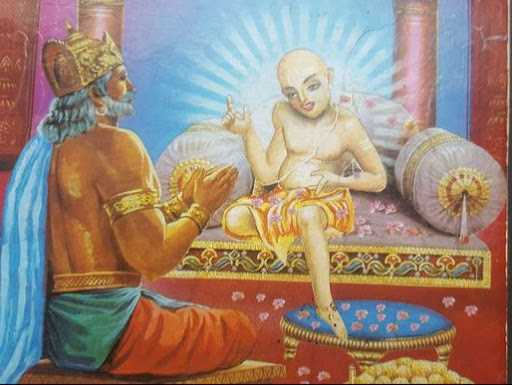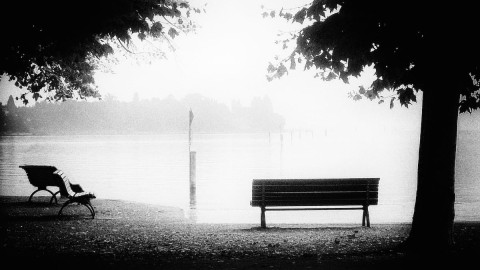In ancient India there was a King called Janaka, who was also a sage. One day Janaka was taking a nap on his flower-strewn bed with his servants fanning him and his soldiers standing guard outside his door.
As he dozed off, he had a dream in which a neighboring King defeated him in battle, took him prisoner, and had him tortured. As soon as the torture began, Janaka woke with a start to find himself lying on his flower-strewn bed with his servants fanning him and his soldiers on guard.
Once again he dozed off and had the same dream. And once again he woke up to find himself safe and comfortable in his palace.
Now Janaka began to be disturbed by several thoughts: While he was asleep, the world of his dreams had seemed so real. Now that he was awake, the world of the senses seemed real. Which of these two worlds is the real one, he wanted to know.
None of the philosophers, scholars, and seers he consulted could give him an answer. And for many years he searched in vain, till one day a man called Ashtavakra knocked at the door of the palace. Now, Ashtavakra means “entirely deformed or crooked,” and he got that name because that is exactly what his body had been from birth.
At first the King was not disposed to take this man seriously. “How can a misshapen man like you be the carrier of a wisdom denied to my seers and scholars?” he asked.
“Right from my childhood, all avenues have been closed to me – so I avidly pursued the path of wisdom,” was Ashtavakra’s reply.
“Speak, then,” said the King.
So this is what Ashtavakra said: “O King, neither the waking state nor the dream state is real. When you are awake, the world of dreams does not exist and when you dream the world of the senses does not exist. Therefore, neither is real.”
“If both the waking and the dream states are unreal, then what is real?” asked the King.
“There is a state beyond these two. Discover that. It alone is real.” replied Ashtavakra.
Observe Your Mind
This story Path Of Wisdom, not only Janaka but we also have this question many times. Then what is the difference between Janaka and us only one thing he woke up towards this question and we have not paid any attention towards such questions.
As We Addicted to Thinking?
Because you identify with thinking, which means that you derive your sense of self from the content and activity of your mind. Because you believe that you would cease to exist if you stopped thinking. As you grow up, you form a mental image of who you are based on your personal and cultural conditioning. We may call this phantom self the ‘ego’. It consists of mind activity and can only be kept going through constant thinking. The term ego means different things to different people, but when I use it here it means a false self, created by unconscious identification with the mind.
As you grow up, you form a mental image of who you are based on your personal and cultural conditioning. We may call this phantom self the ‘ego’. It consists of mind activity and can only be kept going through constant thinking. The term ego means different things to different people, but when I use it here it means a false self, created by unconscious identification with the mind.
The Nature of The Ego
To the ego, the present moment hardly exists. Only past and future are considered important. This total reversal of the truth accounts for the fact that in the ego mode, the mind is so dysfunctional. It is always concerned with keeping the past alive, because without it – who are you?
It constantly projects itself into the future to ensure its continued survival and to seek some kind of release or fulfilment there. It says: “One day, when this, that, or the other happens, I am going to be okay, happy, at peace.” Even when the ego seems to be concerned with the present, it is not the present that it sees: It misperceives it completely because it looks at it through the eyes of the past. Or it reduces the present to a means to an end; an end that always lies in the mind-projected future. Observe your mind and you’ll see that this is how it works.
Learning from the story Path Of Wisdom: Observe Your Mind
Experience Learning
Why we are not paying any attention for such question? As our ego constantly projects itself into the future.
The Present Moment Holds The Key to Liberation
But you cannot find the present moment as long as you are your mind. I don’t want to lose my ability to analyze and discriminate. I wouldn’t mind learning to think more clearly, in a more focused way, but I don’t want to lose my mind. The gift of thought is the most precious thing we have. Without it, we would just be another species of animal.
The predominance of mind is no more than a stage in the evolution of consciousness. We need to go on to the next stage now as a matter of urgency; otherwise, we will be destroyed by the mind, which has grown into a monster. Thinking and consciousness are not synonymous. Thinking is only a small aspect of consciousness. Thought cannot exist without consciousness, but consciousness does not need thought.
What Is Enlightenment?
Enlightenment means rising above thought, not falling back to a level below thought; the level of an animal or a plant. In the enlightened state, you still use your thinking mind when needed, but in a much more focused and effective way than before. You use it mostly for practical purposes, but you are free of the involuntary internal dialogue, and there is inner stillness. When you do use your mind, and particularly when a creative solution is needed, you oscillate every few minutes or so between thought and stillness; between mind and no-mind. No-mind is consciousness without thought. Only in that way is it possible to think creatively, because only in that way does thought have any real power. Thought alone, when it is no longer connected with the much vaster realm of consciousness, quickly becomes barren, insane, destructive.
We can only think creatively when we oscillate between mind and no-mind.
The mind is essentially a survival machine. Attack and defense against other minds, gathering, storing, and analyzing information – this is what it is good at, but it is not at all creative. All true artists, whether they know it or not, create from a place of no-mind, from inner stillness. The mind then gives form to the creative impulse or insight. Even the great scientists have reported that their creative breakthroughs came at a time of mental quietude. The surprising result of a nation-wide inquiry among America’s most eminent mathematicians, including Einstein, to find out their working methods, was that: (Thinking) plays only a subordinate part in the brief, decisive phase of the creative act itself.
The simple reason why the majority of scientists are not creative is not because they don’t know how to think, but because they don’t know how to stop thinking!
It wasn’t through the mind, through thinking, that the miracle that is life on earth or your body were created and are being sustained. There is clearly an intelligence at work that is far greater than the mind. How can a single human cell measuring 1/1,000 of an inch across contain instructions within its DNA that would fill 1,000 books of 600 pages each? The more we learn about the workings of the body, the more we realize just how vast is the intelligence at work within it and how little we know. When the mind reconnects with that, it becomes a most wonderful tool. It then serves something greater than itself.
Tags: Observe Your Mind










